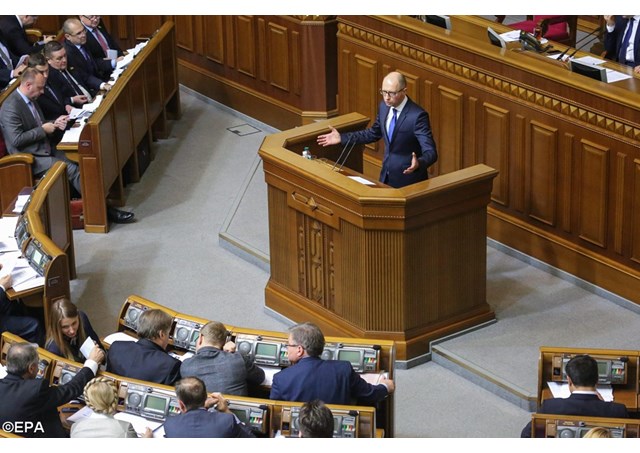
Ukraine's new government faces tough challenges

(Vatican Radio) Ukraine's re-elected Prime Minister Arseniy Yatsenyuk has warned of an even more difficult year ahead after parliament voted in his government.
Yatsenyuk made clear to legislators that his new cabinet faces major challenges in a nation still facing fighting between Ukrainian troops and pro-Russian separatists that killed more than 4,300 people.
Kiev seeks to join the European Union and NATO military alliance, and wants to end deep-rooted corruption in a nation where war rages between government forces and pro-Russian separatists.
However "I am sure we will gain what millions of Ukrainians are now dreaming about," he Yatsenyuk added.
He called it a "complicated and historic mission" but one with historic chances. "We have a chance to create a new Ukraine and to achieve our goals.”
FOREIGN MINISTERS
Among the cabinet members supporting his anti-corruption drive are three foreign-born ministers including American Natalie Jaresko who has experience at the U.S. State Department.
"My experience my understanding of the situation gives me a chance, an aspiration and an inspiration, to work for the good of Ukraine," she told reporters.
One of the first tasks of the government will be dealing with a ceasefire with pro-Russian separatists starting in the Luhansk region.
Their efforts are closely followed by US Secretary of State John Kerry who accused Russia of supporting pro-Russian rebels, charges Moscow denies.
"Since the September 5th, Minsk ceasefire agreement, Russia has funnelled several hundred pieces of military equipment and material including tanks, armoured personnel carriers and heavy artillery pieces directly to pro-Russian separatists in Ukraine,” Kerry said.
TOUGHER SANCTIONS?
He met NATO alliance and European Union ministers who seem reluctant to impose tougher sanctions against Russia, though NATO agreed on a rapid reaction force.
Additionally, the European Commission, the EU's, executive, paid out on Wednesday 500 million euros ($615 million) in financial aid to Ukraine, urging Kiev to push on with reforms.
The payment amounts to the second half of a one billion euro package.
Ukraine also faces energy challenges. Russian media said Wednesday that dozens of towns and villages are without electricity in Ukraine after the government "a technical fault" in what is Europe's largest nuclear power plant.
However Ukrainian authorities said the difficulties cut production but posed no danger, adding that it lies some 300 kilometers west of Donetsk, the conflict zone where the Ukraine's army is fighting pro-Russian separatists.
RADIATION LEVELS
International monitors confirmed they did not detect an increase in radiation levels following the incident that caused one of the reactors at the Zaporizhzhya plant in southern Ukraine to close down.
The International Atomic Energy Agency (IAEA) said it was informed by Ukraine that the nuclear reactor "was safely shut down" following a short circuit in a transformer yard last week.
Since the Chernobyl disaster in 1986, countries are supposed to report any nuclear accident to the IAEA in Vienna, Austria.
Ukrainian Energy Minister Volodymyr Demchyshyn insisted there was no threat. “Today and tomorrow, tests are being carried out and from Friday, the plant will be back working normally. There is no problem with the reactor, there’s no link at all to the reactor. None whatsoever… forget it,” he said.
Yet, it came as a setback as the nuclear industry provides about half of Ukraine’s electricity. Observers said it is expected to be in greater demand this winter due to fuel shortages after the previous suspension of Russian natural gas supplies amid a dispute between Kiev and Moscow over prices.
| All the contents on this site are copyrighted ©. |


